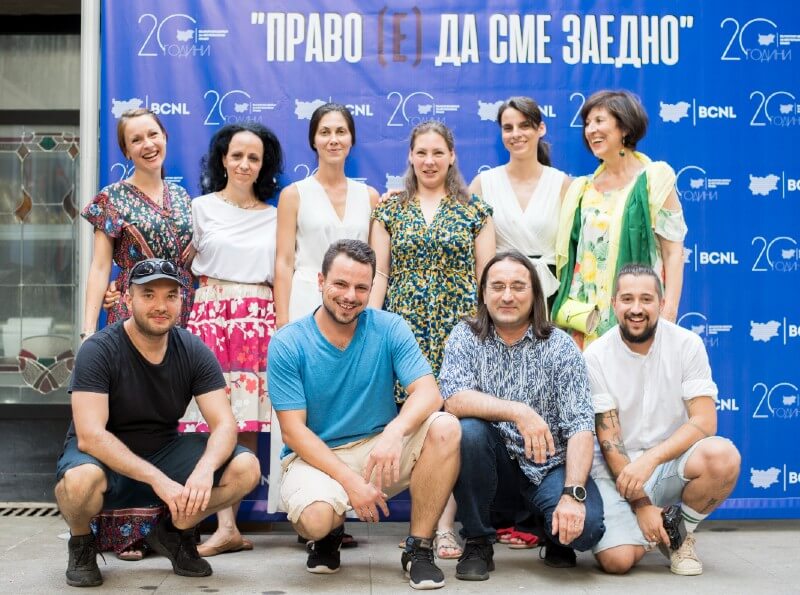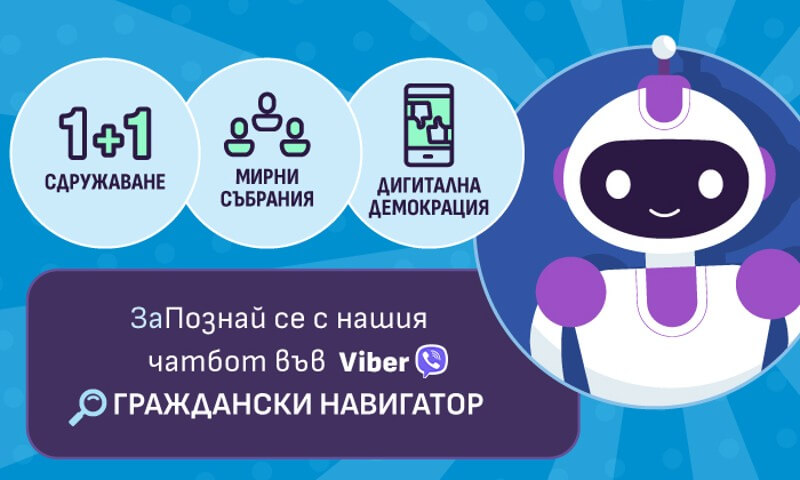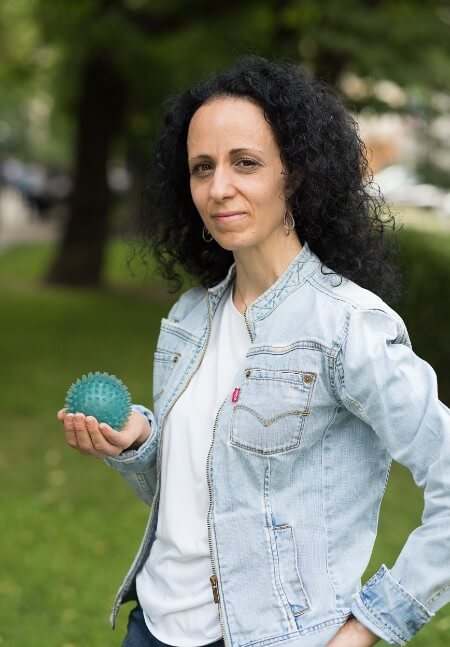
The National Youth Forum unites 46 organizations from around Bulgaria, making it the largest youth platform in the country. Coordination among them was a real challenge before they moved their communication online. The platform they connect on is so easy to use and integrates other digital tools so seamlessly that many a technology skeptic was disarmed, and the forum’s collaboration is better than ever!
Instant messaging and online groups have made a real difference in the work of Maria’s World Foundation, an organization employing and advocating for individuals with disabilities. Not only can the organization reach out to the families it serves faster through these channels, but the families can also give each other support, discuss important issues, and organize.
While it’s important to celebrate the connectivity and access digital technologies provide, we must ensure that everyone is included and our rights are protected online, says Nadia Shabani, director of the Bulgarian Center for Not-for-Profit Law, the largest expert organization supporting the work of Bulgarian nonprofits such as the National Youth Forum and Maria’s World Foundation.
More than 5,000 organizations have benefitted from the Center’s legal expertise, advocacy, social entrepreneurship support, and grant programs since its founding in 2001. The Center’s leadership in areas such as civic freedoms, disability rights, child protection, social services, and anti-discrimination and employment protection law has led to important legislative changes over the years.
The Center also works to facilitate citizens’ and state institutions’ participation in public life through digital means. Its 2020 roadmap for digital participation is an important document in this regard.
Here Ms. Shabani talks about the positive impact of digital technologies as well as the many challenges brought on by the fast pace of development in the digital arena. She offers food for thought and some hope for the future.
New technologies — good news for democracy?
It’s amazing how digitalization democratizes participation! Many of the technological tools we use are quick and easy ways for people to get involved and speak up — to say what they think, here and now, to join efforts for a common cause or idea, and to offer timely assistance.
The beginning of the COVID-19 pandemic highlighted these opportunities really well. People quickly shared information, helped each other, raised funds and support, and got to the bottom of stories that could not otherwise be found. If it weren’t for social media, how would we know about Dr. Li Wenliang [the Chinese doctor in Wuhan who first raised the alarm about COVID-19, ed.]? I will not forget the impact of the Facebook group “We will pull through together” that the Center for Not-for-Profit Law and several other organizations created to quickly exchange information about people who were in a difficult situation. Members reached several thousand in just two-three days. Recently, I needed to have a word with a hearing-impaired colleague, and we resolved the issue after a quick video call on Viber so he could read my lips.
We can quickly and easily talk to people from all over the world, express opinions, share information, say what we think. This is really empowering. It is no coincidence that in countries set on limiting democratic freedoms, internet connections and some digital apps are disabled first.

In one of the Center’s manuals for online public discussions, we compared online communication today with the discussions that took place at public squares and amphitheaters in Ancient Greece. Everyone in these public places could participate so that a balance could be reached between different economic interests, cultural views, and ideas about how to solve one issue or another. Today, social platforms are the new agoras — public places for discussion.
Increased access improves trust
One area that the Bulgarian Center for Not-for-Profit Law has been actively working in for the last two years is adapting and developing tools for civic participation through digital means. We have two goals: to teach public institutions to use these tools correctly and well and to encourage more people to get involved. For example, we provided timely assistance to institutions in the use of different online platforms for public consultation, especially when social distancing measures were imposed. In our view, protecting the public from COVID-19 is an important task, but we cannot suspend our democracy and rights in the meantime. We need to adapt to the new environment to guarantee those rights.
Interestingly, sometimes a challenge is the nudge an institution needs to adapt. For example, several Bulgarian municipalities moved public consultations online after finding themselves in a difficult position due to restrictions.
Another important aspect is knowing how and where institutions share information about their work and how you can get involved. Recently, we conducted a social experiment titled “Parliament is 1 click away” to determine how easy it is to find something or suggest feedback on the Bulgarian Parliament’s website. After the experiment, we facilitated a meeting between parliament members and young people to discuss ideas about how to improve communication between citizens and parliament.
Digital tools are a great way to enhance involvement. What Bulgarian institutions need to understand is that, with easier access and more opportunities for citizens to ask questions, make suggestions, and receive feedback on them, people will feel that they are listened to, and their trust in institutions will increase. If such channels are missing or silenced, people will take to the streets more often, over a variety of issues, precisely because they don’t trust that they are being heard.

Everyone needs a guide
Civic participation is not a chaotic process. To be effective, it must meet certain standards, regardless of the form of participation. That’s why we created a manual for civic participation through digital means, with tips on how to prepare information, how and where to share it, and what you need to do to involve more people. Our new chatbot, Citizen Navigator, offers guidance on peaceful assembly and the right of association and has two goals — to assist anyone interested in setting up an NGO or organizing a protest and to dispel myths about these topics.
The Digital Democracy series is one of our latest initiatives. There are many questions before us: How is equality guaranteed for all, and are our rights protected in the digital environment? How do we integrate digital tools in public service delivery, and how do we make them accessible and secure? How will digital tools and platforms be regulated, and what standards will they have to meet when artificial intelligence is used to manage them and large amounts of data are processed? Where is Bulgaria on the road to digital democracy?
It is important to ask ourselves these questions and gain a better grasp of digitalization and the risks it poses to our rights and democratic principles so that we can reach a consensus on how to address the challenges, as a democratic society would.
Human rights in focus
Our mission is to help people band together and to enable them to exercise and defend their civil rights. On- or offline, we need to make sure we can exercise and protect our rights. The more time we spend online, the more we will have to guard against abuse of our rights in this environment and think about emerging challenges: Is everyone assured access and their full set of rights? Do we have control over artificial intelligence as users? Have all aspects of the standards for equality, personal dignity, etc., been considered?
The very first question we need to ask ourselves is whether artificial intelligence, like everything manmade, provides opportunities or whether it is actually causing more damage than good?
For example, if access is not available to everyone, including to disadvantaged groups (the elderly, poorer people, and those with disabilities, for whom digital tools need to be adapted), we will be merely replicating the inequalities that exist in the offline world. Imagine a world in which only the rich had access to devices.
Another big question is: How is the large amount of available information, including personal information, stored and what is it used for? Where is it collected and by whom, and for what can it be used? Ads make purchase suggestions, but what if, based on the collected personal information, we start getting suggestions about whom to vote for, where and with whom to live, who is an enemy or a threat.
Civil society organizations as cyber-watchdogs
AI-powered systems pervade all aspects of our lives. We use them to search for information online and to optimize agricultural yields; they are built into vacuum cleaner robots and self-driving cars. AI systems are also finding their place in the public sector, and they have increasingly ambitious tasks — automating the distribution of social benefits, helping jobseekers, assessing the risk of gender-based domestic violence, etc. AI is already a reality on which great hopes are placed for the future development of humankind.
AI allows machines to analyze the environment or a large amount of data and, on the basis of the collected information, to make decisions with a degree of autonomy in order to achieve a goal (unlike algorithms that process information according to pre-set rules and are not goal-driven).
The increasing use of AI in decision-making processes that directly affect people generates growing concerns about human rights protection. Who is responsible when human rights are violated as a result of a decision made by AI? Can AI systems be impartial and non-discriminatory?
Concerns about potential human rights violations related to the use of AI systems should not be grounds for opposing the technology. Violations are also possible in decision-making by human beings, but our experience in identifying them and the existing response mechanisms create a degree of trust in them. This means that new mechanisms and legal frameworks should be developed to ensure that existing human rights standards are respected in the context of new technologies. This is one of the first questions societies should debate and make decisions about.
We don’t want to end up like Franz Kafka’s protagonist in The Metamorphosis and wake up one morning to find out we are completely transformed. This is a task for civil society organizations — to be a watchdog for human rights, in every dimension.

